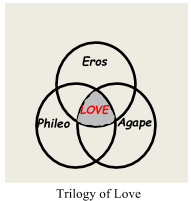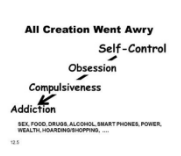“Jesus said to Simon Peter, “Simon, son of John, do you love (Gk. agape) Me more than these?” He said to Him, “Yes, Lord; You know that I love (Gk. phileo) You. He said to him, “Tend My lambs.” He said to him again a second time, “Simon, son of John, do you love (Gk. agape) Me?” He said to Him, “Yes, Lord; You know that I love (Gk. phileo) You.” He said to him, “Shepherd My sheep.” He said to him the third time, “Simon, son of John, do you love (Gk. phileo) Me?” Peter was grieved because He said to him the third time, “Do you love (Gk. phileo) Me?” And he said to Him, “Lord, You know all things; You know that I love (Gk. phileo) You.” (Jn. 21:15-17)
Although one may have a hint of what Jesus was asking of Peter in this great dialogue about love, it is virtually impossible to properly understand this scripture without first knowing the meaning of the words used for love. Note, there are two distinctly different Greek words here translated as love, agape and phileo. Phileo and agape cannot be interchanged with one another as each is unique and distinct from the other.
Jesus asks Peter twice if he ‘unconditionally esteems and values Him (agape).’ In both responses Peter answers that he is very fond and affectionate (phileo) toward Him. The first word, agape, is a godly love that emanates from one’s heart. It issues forth out of life itself and has no need for an outside stimulus. The second response, phileo, involves the emotions. It is actually a response to delighting in a quality perceived in another. In Jesus’s third question to Peter, He understood Peter, in his natural state, was not yet capable of agape love, but was yet bound only to his soulish emotions of a phileo love.
This understanding and experience of agape love would come later to Peter, after Jesus’s resurrection and the sending forth of the Holy Spirit—the Spirit of life. In quoting a passage from Psalms 12, Peter begins, “He who would love (agape) life (zoe)…” (1 Pet. 3:10), thus showing his appreciation for both the highest form of God’s own love (agape) and God’s own life (zoe).* Neither agape nor zoe comes naturally, but is only imparted by the Spirit of Christ.
*For an explanation of zoe life, please refer to the previous Chapter 11 of this series, “The Trilogy of Life.”
Throughout this manuscript, THE MASTER PLAN and Trilogies of the Kingdom, it has been repeatedly emphasized that God’s ultimate purpose in man’s salvation is not just to get him to heaven. Rather, there is a much higher and more realistic calling. As pointed out here, our Father desires to make available to man the Divine qualities of His own life (zoe) and character (agape love being its highest expression). It is through these Divine qualities that man truly finds the highest form of fellowship with the Father and the Son through the Holy Spirit, and with one another in the Church. They are relationships that may begin in this present life but continue on into eternity. The necessity of a clear understanding and appropriating of His agape love is not only foundational, but is the essential building block of our new constitution of life in Christ.
The Trilogy of Love

Man is body, soul, and spirit. (Refer to Chapters 7 and 8 of this series.) What is described in the Greek as “love” finds its expression also in three dimensions, from its most primitive and base expression as eros, to that of the inner feeling of an emotion as phileo, and its highest innermost Godly expression as agape. One thing apparent is, by far, the vast majority of professing Christians have a misunderstanding of the Lord’s command to “love one another.” As mentioned above, in Jesus’s discussion with Peter, a misunderstanding in the church exists between phileo and agape love as well. And, all too often, a secular view of love is taken, with no real appreciation for the Biblical, or Godly view of love.
In the following pages, we will explore these various meanings of love, their impact on the life of the believer, and how they may properly fit into God’s Master Plan for man.
Eros: Love as Passion
By name, Eros is the Greek god of erotic love. That alone gives us some inkling as to its nature. It represents man’s impulse to gratify basic needs. The word eros is not used in the Bible—except in one instance. In the Greek Old Testament, the Septuagint, this word is used to describe a very illicit sensual scene in Proverbs 7:17-18. Here, God uses the analogy of an adulterous woman enticing a man to lay with her as a warning for His people to stay focused upon His words and to not turn aside.

In the New Testament, there is a duplicate for the word eros. If eros were to look into a mirror it would see itself as sarkikos, which means fleshly—a word frequently used. Sarkikos, like eros, pertains to the nature of the flesh, sensual, with carnal desires. Peter writes regarding those who walk according to the flesh:
“…Beloved, I urge you as aliens and strangers to abstain from fleshly lusts which wage war against the soul…”
(1 Peter 2:11, see also 2 Pet. 3:18)
All creation went awry. Adam was created with basic instincts. He had an inner impulse to protect and preserve himself and to procreate. There was nothing inherently wrong with these instincts for food, drink, intimacy with his wife, or desire for safety and well-being. God looked upon this man and everything else He created and “saw it was good.” However, when sin entered the world through Adam, all creation went awry. Thorns, thistles, pestilence, disease, earthquakes and floods corrupted and contaminated the earth. Also going awry were these basic instincts in man corrupting his very nature.
Basic instincts and impulses, that were once good, magnified into inordinate perversions and lusts. “Me,” the ego-center of man, was now the center of focus and demanded obedience. Man became fleshly with sensual and carnal lusts. His protection instinct deteriorated into striving for power, murder, even warfare. His preservation instinct degraded into greed and lust for more and more of life’s pleasures. Normal intimate relationships degenerated to erotic love as in pornography, prostitution, adultery, and homosexuality and any other deviant sexual behavior.

Degradation was seen in man’s character as well. His once self-control slowly gave way to an obsession about things and situations in his life. Obsession slowly sunk into a compulsive “must have,” and then into addictions in which “I” had to be satisfied at all costs. Addiction resulted in a physical and/or psychological disorder that craves a particular substance or activity dominating one’s life.
Today, our culture is saturated with a fleshly mind filled with materialism; quest for recognition, power and fame; chemical addiction; and an inordinate emphasis and lust for sex. O how I wish I could say this is only of the world but not a part of the church. However, in my lifetime I have seen nationally recognized evangelists fight one another for top television ratings by engaging in subversive tactics uncompromised in the secular business world. Often, what would begin as a ministry of the Gospel, living by the grace of God and the charity of God’s people, turned into a “for profit” multimillion dollar business. “Seed faith” and “prosperity” messages have shamefully taken on a new and deceptive meaning as things are consumed by the fleshly desire for fame, fortune, and ‘divine’ health. All the while the inner spirit remains wanton and poor. The lust for sex in the form of prostitution, adultery, and homosexuality has been witnessed in some of the most well-known nationwide ministries and churches. Pedophile priests, pastor/church secretary affairs, and ministers addicted to computer pornography have even faced exposure by the secular media. “For ‘the name of God is blasphemed among the gentiles because of you,’” so reads Romans 2:24.
The flesh is not going away. The Church as a whole, and the individual members of the Body of Christ, must come to grips with the power and influence on the believer of eros love, better known Biblically as sarkikos. Speaking to believers, Paul made it clear that, “Those who are in the flesh cannot please God.” (Rm. 8:8) The flesh is with us to stay, at least in this lifetime. The flesh does not just vanish with the new birth or the baptism with the Holy Spirit. Paul admits this, as he writes, “For I know that in me, (that is in my flesh) dwells no good thing.” (Rm. 7:18) The only way to deal with the flesh, to overcome it and bring it into submission, is by revelation of the word of God and faith. To be fleshly is simply to cave in to the strong impulses of the flesh beyond the basics needed for survival. It is the impulse to fulfill self-pleasing cravings. Focus is upon self and the expectations of God are secondary.
What must I do? One may say, “I do not want to be displeasing to God, or alienated from Him in any way.” “What shall I do?” “How might I overcome this ‘thing’ that urges me to do that very thing I regret doing?” The answer is spiritual, not natural. The answer has nothing to do with resolutions, sheer determination, or as some popular TV motivational evangelists would encourage, “the power of positive thinking.” For you see all these things are of the flesh originating from within man and not God. If it is of the Spirit there can be no boasting of the flesh—there can be no “I did it.”
This battle between the flesh and the Spirit lies within the inward part of the believer. It is overcome by confidence in the Word and in the indwelling Christ. Let us read carefully the following scripture in Romans 8:9-14. In doing so, note especially the tiny word “if.” It is a “conditional particle” of great importance.
“However, you are not in the flesh but in the Spirit, if indeed the Spirit of God dwells in you. But if anyone does not have the Spirit of Christ, he does not belong to Him. If Christ is in you, though the body is dead because of sin, yet the spirit is alive because of righteousness. But if the Spirit of Him who raised Jesus from the dead dwells in you, He who raised Christ Jesus from the dead will also give life to your mortal bodies through His Spirit who dwells in you. So then, brethren, we are under obligation, not to the flesh, to live according to the flesh—for if you are living according to the flesh, you must die; but if by the Spirit you are putting to death the deeds of the body, you will live. For all who are being led by the Spirit of God, these are sons of God.” (Rm. 8:9-14)
This victory over the flesh by the indwelling Spirit of Christ is offered by the grace of God the Father…and received by faith.
Phileo: Love as Affection
If eros (fleshly) love finds its roots in the flesh, which is the carnal nature of fallen man, phileo love finds its roots in the emotions of his soul.
I once met a young man working on his Master’s Degree in psychology. The subject for his thesis was love. He came to the conclusion that love was basically “selfish.” He arrived at this conclusion simply because he felt people are drawn to another, or have affection for another, because the other is particularly pleasing to them. They are drawn to that personality and want them for themselves. In other words, the attachment or affection for the other is simply because the other is pleasing and delightful to be with. This is phileo love. It is a response to the pleasure one takes in another.
The goodness of Phileo love. Phileo is a love that is called out of one’s heart by “qualities” in another. I believe God intended for Adam and his progeny to experience this kind of love. This is a love that finds pleasure in the company of another. Phileo is certainly higher than eros love and can be very pleasant and rewarding. It is good to have phileo love in one’s life. To love or be loved in this manner expels loneliness and brings joy and satisfaction in one’s heart. To be without it causes an emptiness that seeks to be filled in other ways. We must hold dear those with whom we share this kind of love and not abuse the relationship or take the relationship for granted, guarding it as a precious gift from God. It is a real blessing to enjoy the company of your spouse or good friends. There are brothers and sisters in Christ that I phileo love very much. I deeply enjoy their company and would be deeply grieved should any meet with misfortune. I thank God for this soul-bonding love.
Problems with Phileo love. Just as eros love became perverted into fleshly lusts after the fall of Adam, so too a perversion settled into the realm of Adam’s soul and his nature of phileo love. With this fall came a heightened awareness and sensitivity to the demands of “self.” I once had an uncle whose phileo love for his wife, my aunt, degenerated into jealousy. He became so jealous and possessive of her that she could no longer live with him. Their married life became miserable. As I write, my aunt, a very good gentle woman, has turned 102 years old. She so valued her sacred vows of matrimony that she never remarried. In others, an abnormally strong attraction towards another may expresses itself as “stalking,” in which one relentlessly pursues another even though the other has no interest in the pursuer.
It is often said that people “fall in love.” They are almost instantaneously smitten by another and deeply desire a closer relationship, even marriage. If however, something happens later on in this relationship, where the dynamics of the relationship change, they may just as quickly “fall out of love.” Like all emotions, phileo love is not a constant but may vary in intensity with time and situation. Phileo is never on an even keel, it may wax strong one moment and wane the next. It may grow progressively stronger over time as two become soul-mates or it may fade over time and relationships simply dissolve. In some cases of division it is replaced by its opposite, dislike or even hatred. Phileo love alone cannot sustain the Church.
Phileo love in the Church. Phileo love may well add to unity in the Church, and to its warmth, but cannot be the basis for its oneness. This requires another higher kind of love, agape. Phileo love is found to be too inconsistent, too variable to adequately sustain fellowship of the higher level in the Church.
There is a sensitive issue arising out of a misunderstanding of Jesus’s command, “A new command I give you: love one another. As I have loved you, so you must love one another.” (Jn. 13:34) All too often the word for love here is misunderstood to be phileo love, a love of feelings, of liking, having fondness, or affection for others. However, an altogether different Greek word for love is used here, agape love, which will be described in detail in the following section of this article. The problem being, if taken as phileo love, one believes that he or she must have or develop a likeness or fondness for everyone in the church—regardless of personalities, character traits, motives, attitudes, moral weaknesses, and so on.
One may unsuccessfully “try” to phileo love another, even after having prayed about it. With this thought process, he or she may come to have a sense of guilt over failing to be obedient to what is thought to be the Lord’s command. Does the fault lie in the individual or with misunderstanding scripture? It is the latter. This thought is partially promoted by the secular world surrounding and influencing the Church. Society only perceives this level of love, which is phileo.
This misconception, regarding the substitute of phileo for agape love, in this scripture brings a further problematic issue into the church. (Care must be taken to understand the following.) If one has difficulty having phileo love for some others in the Church, then perhaps he or she may try to emulate this love even in absence of feelings. He or she determines that phileo love has certain qualities or attributes to it such as: tolerance, forgiveness, being non-judgmental, acceptance, etc.
However, when these expressions are applied as a substitute or proxy for true phileo love, they are universally applied to everyone. So, the thought becomes, “We as a church must be more tolerant, forgiving, non-judgmental, accepting and so on. If we don’t at least show these moral expressions, how else can we express phileo love?” Therein lays the root of the problem. In trying to wrongfully express phileo love in this manner, both the spiritual and natural doors of the church are open to receive everyone on the basis of society’s norms and definition of love and not on the holiness and righteousness of God. Church doors become open to perversions—even as a recent TV ad for a particular denomination reads: “Open Doors, Open Mind, and Open Heart.”
In such cases, these “open” and “loving” churches fail to judge and adequately deal with moral issues of sin, deviant behavior, immorality, and an overall quasi-Christianity. It is as in Ezekiel’s day when the temple of God became polluted with all sorts of images and immoral practices. (See Ez. 9-11) The glory of God began to slowly lift from the sanctuary, and then simply departed the temple entirely. The priesthood continued to practice, sacrifices were made, and feast days and rituals continued to be observed, but the glory of the presence of God was missing. The temple became of man, by man, and for man. Regrettably, this scenario is played out in many churches today. These churches become a place to service the emotional needs of man and to satisfy his “religious” needs with a pseudo-phileo love, but the presence and power of God to work His life and righteousness in a people is missing. Lord have mercy.
Agape: Godly Love
This may be a truthful saying, that some in the church do not have “endearing personalities.” I, for one, am uncomfortable around certain individuals. Pardon me for being so descriptive, but I wish to be forthright. I have difficulty fellowshipping with some that are very bold, aggressive and/or domineering in character—some even to the point of being controlling. Some are opinionated and not open to hear opposing views. Some have a critical spirit, always finding fault or weaknesses in others. I may be able to worship and find fellowship in the Spirit with these individuals, but otherwise I find their company unpleasant. I do not believe I am alone with this situation. How can we ever have unity in the Church if this alone is the prevailing attitude?
Thankfully, believers are not commanded to “like” one another. No, this thought is forced upon the church by misconception and by society. We are clearly commanded to agape love one another, as God so agape loves us. Jesus’s command is, in truth, “A new command I give you: (agape) love one another. As I have (agape) loved you, so you must (agape) love one another.” (Jn. 13:34) Thus, phileo love, a love of feelings, of fondness and affections, is not the basis of this command to love one another!
Agape love is the highest form of love. It is above the passions of the flesh and the heat of emotions. This love continues to love even if the other is unresponsive, unkind, un-endearing, unlovable, and unworthy. Agape love is not based on the merit or worth of another, but is emitted from the heart, even as it is expressed from God, who is the ultimate Father or source of this love….
“…hope does not disappoint, because the love of God has been poured out within our hearts through the Holy Spirit who was given to us.” (Rm. 5:5)
Imagine that, the love of God has been poured out within our hearts through the Holy Spirit who was given to us! The love of God, agape love, is the greatest power or force in the entire universe. It is the core of His being. Agape love drives the heart of God, forms His purposes, determines His acts and ways, and is the basis for the intimacy of His oneness and fellowship. By Divine act, the essence of this love is deposited in the believer, in Christ! I am afraid the human mind is incapable of understanding the magnitude of this miracle, but we can only give ourselves to its truth and by simple faith, yield to it:
“I in them and You in Me, that they may be perfected in unity, so that the world may know that I have made Your name known to them, and will make it known, so that the love with which You loved Me may be in them, and I in them.” (Jn. 17:23)
Thus agape love is foreign to the unregenerate. It is deposited into the heart by the Holy Spirit. It is a true miracle of the power of God in us. Realization of this awesome truth should cause the knees to weaken, the head to bow, and the heart to overflow with praise and thanksgiving.
A many-faceted love. Agape love desires only the good for another—it is a passion for the well-being of others. Like a diamond, agape is many-faceted as described in 1 Corinthians 13.
Facets of Agape Love
“Love is patient, love is kind and is not jealous; love does not brag and is not arrogant, does not act unbecomingly; it does not seek its own, is not provoked, does not take into account a wrong suffered, does not rejoice in unrighteousness, but rejoices with the truth; bears all things, believes all things, hopes all things, endures all things…. Love never fails; But now faith, hope, love, abide these three; but the greatest of these is (agape) love.” (1 Cor. 13:4-8, 13)
The epitome of agape love. While not neglecting physical needs, the greatest expression of agape love is focused on the “spiritual well-being.” In John 6, Jesus is concerned about the physical well-being of the multitude. He took five loaves of bread and two fishes and feeds the 5000 men (plus women and children). However needful satisfying hunger was, His greatest love manifested to the spiritual well-being of the people, to draw them closer to the Kingdom of God (to the Father and Himself).
Every epistle written (28) was focused on the spiritual well-being of the Church, and each member of its Body. I believe every letter expresses the same love and passion which Paul had for the Church. He condensed it all down to the singular declaration:
“…to whom (the Church) God willed to make known what is the riches of the glory of this mystery among the Gentiles, which is Christ in you, the hope of glory. We proclaim Him, admonishing every man and teaching every man with all wisdom, so that we may present every man complete in Christ. For this purpose also I labor, striving according to His power, which mightily works within me.” (Col. 1:27-29)
This epitomizes the highest caliber of agape love. To have one’s life embroiled in passion for the Church, given over entirely to it, is the most practical manifestation of agape love. Though physical needs might be many; and they may wax and wane throughout life, they will nevertheless one day cease entirely. Spiritual needs on the other hand are far greater. These express the malnutrition, leanness, and want of the soul; a soul that one day will not cease but will continue on into eternity. Not neglecting or being indifferent to basic physical needs, agape love reaches out to these spiritual needs through exhortation of the Word, encouragement, admonition, correction, and discipline.
The prophet Jeremiah wept over Judah because they would not heed the Word of the LORD. They refused correction and obedience to God’s commands and the Covenant. (Jer. 9:1) His tears were caused by the consequences he saw of God’s coming judgment. God deals with His people as sons, not strangers. (Heb. 12:5-8) And as sons, He disciplines and corrects them to bring forth His desired qualities and purposes. The actions of the people of God bring testing and judgment, and judgment brings consequences. The consequences may be positive in form of blessings and intimacy of fellowship. Or, they may be of discipline and separation. Jeremiah understood the severe impending consequence of Babylon conquering Judah, destroying the temple, taking their land, and bringing them into captivity. Of this discipline, Hebrews 12:10 says that God, “…disciplines for our profit, that we may partakers of His holiness.”
Spiritual consequences. Many with whom I associate are in agreement regarding the condition of much of the Church today. If the Lord would prophetically speak to the Church today, He may very well speak as to the Church of Laodicea:
“Because you say, ‘you are rich, have become wealthy, and have need of nothing’—and do not know that you are wretched, miserable, poor, blind, and naked.” (Rev. 3:17)
Life itself has departed from much of the Church and ‘religion’ consumes a great deal of its activities. It has a facade of Christianity but functions in programs and rituals. The Lord purposed the Church to be a living functioning body. It has, however, fallen into religious systems of clergy and participating congregations.
What may be the consequences of a spiritually impoverished Church? We read that the Laodicean church stands in need of rebuke and chastening from the Lord. His agape love for this church is expressed in this call to repentance. They receive an ultimatum from the Lord to repent (or else!). They stand in jeopardy of severe consequences or danger…
1. …of the church having its Lampstand removed, as promised to the church of Ephesus. (Rev. 2:5) This gathering of believers and church leaders may still function as a church, with all its programs, rites and rituals, but conspicuously absent will be the presence of God in Spirit.
2. …that one may become disqualified to continue to function in calling or ministry. The anointing is lifted. Paul feared this for himself as he ran the race before him (1 Cor. 9:27) and as he cautioned others to so examine themselves less they be disqualified. (1 Cor. 13:5) To be “set aside” from properly functioning in the Church as Christ has purposed is most terrifying.
3. …of loss. The Lord, in the letters to the seven churches of Asia in Revelation 2 and 3, and elsewhere in Scripture, makes special promises to those who repent and become overcomers. The antonym for overcome is “to lose.” This of course does not mean to lose eternal life, but the loss of added blessings and rewards of obedience. (This is clearly brought forth in 1 Cor. 3: 14-15.) This is not in the realm of punishment, but in loss certain blessings in terms of eternal relationships and functioning in His kingdom.
There is a sober truth, “Blessed are the dead who die in the Lord from now on. ‘Yes,’ says the Spirit, ‘that they may rest from their labors, and their works follow them.’” (Rev. 14:13) Works here means far more than good deeds. It includes behavior and the course of conduct rising out of faith, doing the will of God. These are received and blessed of God. It must be remembered that there are also dead works and evil works devoid of the life that has its source in God, works which at the last judgment will fail of the approval of God and all reward.
Love of God perfected. We have thus seen that what may be singularly termed love in the English language may be actually rooted in three very different Greeks words:
Eros: This is a fleshly lusting after another or even things in general. It is a base need for self-gratification. Because of the fall of Adam, self-control is weakened as lust has gained in strength.
Phileo: A higher love of an attraction based upon desirable or pleasing qualities in another. It is a love of emotion, of feelings towards another. This love is variable, waxing and waning in relationships. It can grow to great strengths as soul-mates or best friends forever (BFF). It is a love of self-satisfaction. This love, however, cannot sustain the Church.
Agape: The noblest word for love in the Greek language. The highest love, called out of one’s heart because of the preciousness of others. It is not kindled by any merit or worth of another, even when the loved is unresponsive, unkind, unlikeable, and unworthy. It originates in one’s own God-endowed nature. God is love. Unlike phileo, agape is a constant. It does not depend on feelings, time or circumstances. This love is to be pursued and perfected (made complete). It is a selfless love. Only this love can sustain the Church in unity and true spiritual growth.
We conclude our discussion of the trilogy of love joining in an encouraging prayer of Paul for the church at Thessalonica:
“…may the Lord cause you to increase and abound in (agape) love for one another, and for all people, just as we also do for you; so that He may establish your hearts without blame in holiness before our God and Father at the coming of our Lord Jesus with all His saints.” (1 Thes. 3:12-13)
Amen!



